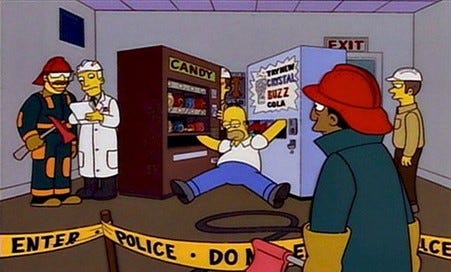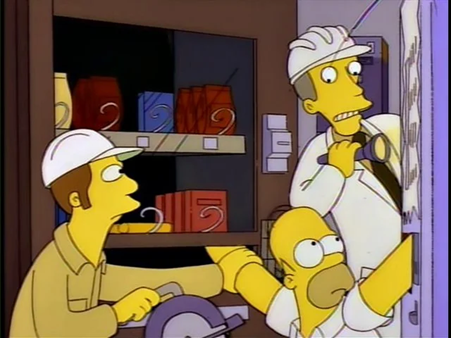The "Two Hands Clutching at Cans" Theory of Healing
It’s been hard. Every day since she left I can’t stop myself thinking about her. I wonder about where she is and what she might be doing, I follow her socials, I write messages to her, half of which I can’t even send, but the other half …
I’ve been feeling tired for months. Simply lethargic. Exhausted. My muscles ache and I’ve got this strange pain in my side. It’s just by my liver or kidneys, I think. I went to a number of doctors but apart from talking about my diet they can’t seem to find anything wrong with me, so of course they say it’s stress. But I exercise and eat well enough, and I get 8 hours of sleep, usually, even though, well, I never wake up feeling rested …
I’m not motivated any more. I find it hard some days to even get out of bed. I mean, I enjoy spending time with my friends and family, but less and less so. I don’t want to admit this to myself, much less to my friends, but I guess I have to if I’m going to be honest with myself. Most of my time is spent in my room on my phone. Pouring through this and that; chats, posts, memes, music, swipes, it makes the time fly by. But at the end of it, if I’m truly honest, right before I pass out in sleep, all I can do is shake my head and feel weak to my stomach, in a daze, like life is passing me by and I am missing out …
The problems of life are common. The woes of our society have almost become normal. But underneath the expectation that these ailments warrant healing there has run a consistent vein for at least the last five hundred years. We suffer as rational egoists. Our minds recognise suffering, process it, and try to find solutions. We are driven by a rational instinct to survive, thrive, and individually prosper.
So when this rational egoist encounters mental, physical, or social sickness in a technocratic society that claims to be at the peak of civilisation’s powers to offer healing, why does it sometimes seem that the increasing burden of sickness is almost accepted as the norm? Why do we feel defeated into an acceptance of our suffering?
In an episode of The Simpsons, Homer is meant to go to the ballet with Marge. On his way out of work, he sees a soda machine. He thinks he has time to grab a nice cold drink. But when the machine doesn’t work, he tries to stick his hand up the disposal shoot and nab a can for free. He gets stuck. Desperate to not disappoint his wife, he drags himself toward the exit with the machine caught on his arm. Then, he spots another soda machine. A few minutes later he is calling Marge explaining that he can’t make it to the ballet because he is stuck in two soda machines, one glued to each arm.
When the medics come to help him, they can’t seem to free him, try as they might.
Medic: Homer, we’re going to have to saw your arms off.
Homer: They’ll grow back, right?
Medic: Um, sure.
Just as the savage buzz of the saw kicks off and the blade inches toward his arm, a man with a torch peers into the machine and realises something.
Medic: Homer, are you just holding on to the cans?
Homer: Your point being?
Perhaps the feeling Homer underwent as he ran out from the power plant, clutching at his sore arms with a miserable, piteous look on his face as the laughter of the medics rang out behind him, is the same experience that we so desperately want to avoid when we face up to sickness and pain. Shame and loss. Is it partly my fault that I hurt? Is this why we hold onto our cans, or is there a deeper reason?
How many of us, individually and collectively, flaunt the rational-egoist stereotype by actively or passively holding on to the very sickness that we despise? This makes no sense if we are rational-egoists designed to figure out our way to survival and prosperity.
Perhaps a deeper reason lies underneath this. How many of us are instinctively caught up in a parasitic nexus with our illnesses in such a way that we derive identity and bitter energy from our pains, complaints, and misery because we do not want to sacrifice the part of our identity that needs to be lost so as to move past the sickness? To let it go, must we let ourselves go?
The idea that we (hold onto our cans) choose our sickness over our health is nothing new, or even particularly interesting. Neither is the idea that we are attracted to what is hurting us. What is interesting is the assumptions this concept breaks down. For the rational egoist assumes that when we hurt, we firstly think, then we choose some external mechanism or object (a pill, a treatment, a therapist, a healer, a spiritual or emotional path), and then we attempt to absorb this into our current selves in order to save ourselves.
Oh yeah, I’ve been dealing so and so. It’s a such and such sickness. But I’m seeing this and that and taking X, Y, and Z so lets see how this sorts it out. There should be progress …
It is a complete, rational, purposeful, and self-cognisant ego aiming to restore its integrity and keep its current path by overcoming some kind of intrusion, some blip, some sort of degrading obstacle in its otherwise upwards progress through life. The sickness, the can. But if we are holding onto our cans and this is key reason we are trapped, then …
We need to let go of our identities to be healed. We need to sacrifice something which we are holding onto for dear life. We need to lose a part of ourselves at not merely at a material (body) or rational (mind, choice) level, but at a deeper, more instinctive place. A place we may fear to explore. And this becomes even more interesting if we are holding on to the cans of our sickness not only at as individuals, but collectively, as families, societies, cultures, generations, and as an entire civilisation.
It is little wonder that we prefer the known safety of managing our deep illness rather than having to restructure and rediscover our identities at an instinctive and collective level. The cult of safety makes it hard to hear, ‘Homer, are you holding on this thing you wanted so badly that not only did you risk breaking a promise to your beloved wife to get it, but also seem to have done so at such a deep, intuitive level that your rational mind isn’t even aware of it, so much so that when I asked you if you were holding on to the cans you said, “your point being?”’
Maybe you’re thinking, “fuck, Homer is just stupid.” Fuck, maybe that’s why you and I are sick. The stupidity of holding on to the very things causing all of our fucking drama. Yet is there not a difference between rational stupidity and intuitive, collective, dumb instinct, at least at the level of gnawing guilt?
It’s been hard. Every day since she left I can’t stop myself thinking about her. I wonder about where she is and what she might be doing, I follow her socials, I write messages to her, half of which I can’t even send, but the other half …
Maybe you need to just go cold turkey. Stop talking to her altogether, at least for a while. Give yourself a break and some space.
Yeah I could, I know, but what would she think? I don’t want to be a prick, you know, be that guy. And I can of course learn how to be cool about it. We should be able to talk like civilised people. But then she ghosts me and its so hard. Why does she do that? I’ve got to try something …
We’ve all met or been the relational co-dependents, lovers whose love is a burden on the soul, a coming together that is the mutual digging of a hole that neither can see, the drawing closer only to fly apart only to draw close yet again, a needful futility.
I’ve been feeling tired for months. Simply lethargic. Exhausted. My muscles ache and I’ve got this strange pain in my side. It’s just by my liver or kidneys, I think. I went to a number of doctors but apart from talking about my diet they can’t seem to find anything wrong with me, so of course they say it’s stress. But I exercise and eat well enough, and I get 8 hours of sleep, usually, even though, well, I never wake up feeling rested …
That sounds awful. Have you tried anything to be less stressed? There’s lots of things out there. Meditation, yoga, running. And, just being honest, you do have a lot going on in your life. Maybe you need to reconsider some things, like your career, where you live, what you want in life?
You don’t understand, do you? It’s not stress. I’m not that stressed. Are you saying I can’t handle myself, that I’m weak? Look, I just need to get my body right so I’m not tired. My life is fine. I’ve tried taking time off or a break and its not for me. I don’t know what to do with all that free time and stillness and quiet. I go crazy.
So, in a way, if you feel like you can handle it, things aren’t that bad, are they?
What? You’re not listening, you don’t get it. It’s really awful being this tired all the time. How would you like to be this exhausted? I mean, I’m tired all the time, and it doesn’t matter what I try, it’s just so hard …
We’ve all been or known that person who seems to complain, rage, moan, or mutter all the time about their ailments and aches and worries, but never seems to understand any of the options offered to them, and deflects any suggestion that there are some big things in their life that are potentially causing their stress, big things that they should explore. They actually seem to get a rush from expressing their suffering, and this is almost a pay-off for the normalcy of their pain.
I’m not motivated any more. I find it hard some days to even get out of bed. I mean, I enjoy spending time with my friends and family, but less and less so. I don’t want to admit this to myself, much less to my friends, but I guess I have to if I’m going to be honest with myself. Most of my time is spent in my room on my phone. Pouring through this and that; chats, posts, memes, music, swipes, it makes the time fly by. But at the end of it, if I’m truly honest, right before I pass out in sleep, all I can do is shake my head and feel weak to my stomach, in a daze, like life is passing me by and I am missing out …
Alone. Lonely. Caught up in our chitter-chatter monkey brains. A private rational ego-island of guilt and blame, of frustration hinging on hopelessness. We are almost resistant now to external stimulus and outside opportunities to find a new identity, so caught up are we in this pain self, this victimhood, this avoidant secluded crushed self.
So, how do we let go of our cans? TBC…





